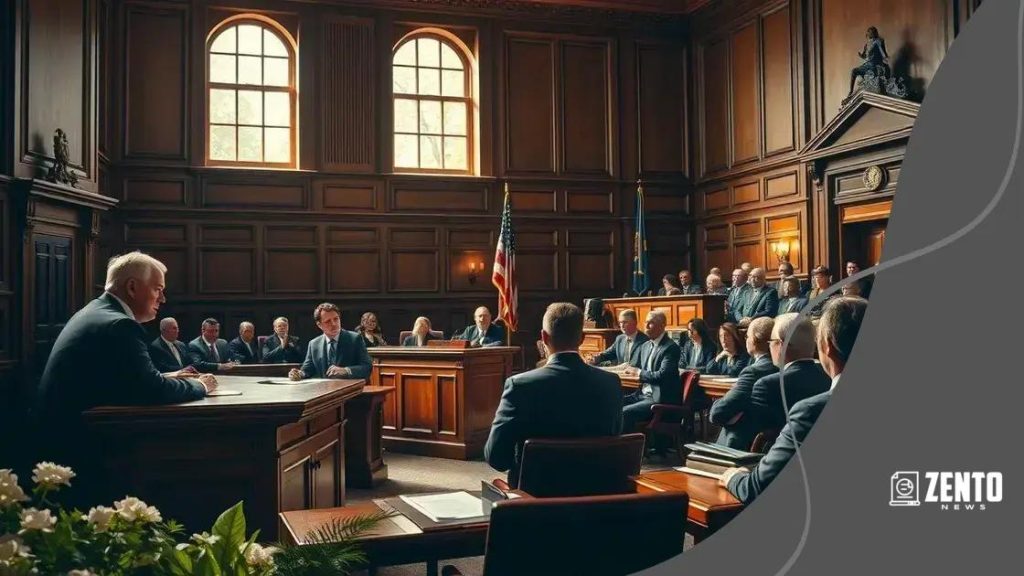May court rulings: what they mean for your rights

Anúncios
Protecting your rights after court decisions involves staying informed, consulting legal experts, and actively engaging in community discussions to advocate for necessary changes and ensure compliance with rulings.
May court rulings are not just legal jargon; they can shape your daily life in unexpected ways. Curious about what these rulings mean for you? Let’s dive in and explore their implications.
Anúncios
Understanding the impact of May court rulings
Understanding the impact of May court rulings can be vital for individuals and communities alike. These rulings can set significant precedents that affect various aspects of society.
When courts make decisions, they often consider past rulings, statutes, and the Constitution. This ensures consistency and fairness in the legal system. Additionally, May court rulings can influence public opinion and policy changes.
Key Areas Affected
Several areas of life can be influenced by these court decisions:
Anúncios
- Civil Rights: May rulings can protect or restrict civil liberties.
- Employment Policies: Court decisions might affect workplace regulations and employee rights.
- Healthcare: Legal interpretations can impact access to medical services and insurance coverage.
- Education: Rulings can determine funding and resources available to schools.
As these rulings unfold, they create a ripple effect throughout communities. For example, changes in employment laws can lead to shifts in job market dynamics, affecting both employers and employees.
Moreover, public enthusiasm or opposition can arise from these legal changes, illustrating how interconnected the legal system is with everyday life. Individuals often rally around a court case, bringing attention to issues that matter most to them.
Understanding how May court rulings shape society can empower individuals. By being informed, citizens can advocate for their rights and influence change.
Key cases this May and their implications
In May, several court cases can have lasting effects on the law and society. Understanding these key cases is essential for everyone.
Not all cases receive the same attention, but some have crucial implications. A few notable cases might reshape policies on education, healthcare, and civil rights.
Important Cases to Watch
Several cases stand out this May:
- Case A: This case addresses vital issues surrounding student rights in schools.
- Case B: This ruling focuses on healthcare access and affordability, impacting millions.
- Case C: This case examines workplace discrimination, influencing future employment practices.
- Case D: This ruling involves environmental regulations, affecting community health and safety.
Each of these cases carries weight. For instance, Case B may change how insurance policies work, making it easier or harder for people to access the care they need. In addition, Case A might open up discussions about students’ rights to free speech.
It’s important to stay informed about these developments. They reveal how courts interpret laws and affect everyday life. Following updates on these cases can help individuals understand their rights and responsibilities better.
Furthermore, public reactions to these decisions can play a role in shaping future cases and legal interpretations. As community members engage in discussions, they can influence lawmakers and, ultimately, judicial outcomes.
How May court rulings influence public policy

May court rulings play a crucial role in shaping public policy. When courts decide on important cases, they can set legal precedents that influence future legislation.
These decisions often reflect societal values and can push lawmakers to reconsider existing laws. As a result, when courts interpret laws, they may open windows for new policies.
The Role of Precedents
A ruling can create a precedent that other courts must follow, impacting future cases. This guide explains how such rulings can lead to significant changes in public policy:
- Judicial Interpretations: Courts can interpret laws in ways that impact entire sectors, such as education, healthcare, and civil rights.
- Influencing Lawmakers: When courts highlight gaps or issues in the law, lawmakers may feel pressured to enact reforms.
- Public Sentiment: High-profile rulings can trigger public reactions, pushing for an agenda that lawmakers cannot ignore.
- Policy Changes: Laws may evolve to align with new judicial findings, leading to immediate changes in how policies are implemented.
Additionally, the implications of these rulings often extend beyond the courtroom. When people see the effects of a ruling, they may become more vocal about their rights and concerns. This activism can lead to legislative debates and changes.
The dialogue between courts and policymakers can help reshape society’s framework. As courts define rights and responsibilities, they help establish norms that affect everyday lives. Citizens and advocacy groups closely monitor these rulings, recognizing their ability to influence future policies profoundly.
What to expect from future court rulings
Understanding what to expect from future court rulings is essential for staying informed. Courts continuously adapt their interpretations of laws based on societal changes and precedents.
In upcoming rulings, we might see more emphasis on civil rights and social justice issues. Significant shifts in public opinion can also influence judges, making their decisions crucial.
Potential Trends to Watch
Several factors may shape future court rulings:
- Technological Advances: With technology evolving, courts may address new legal challenges related to privacy and cybersecurity.
- Environmental Law: As awareness of climate change grows, we can expect more cases concerning environmental protection and sustainability.
- Healthcare Access: Future decisions might focus on access to healthcare and insurance coverage, particularly after recent legislative changes.
- Education Rights: Courts may continue to examine education policies, especially regarding funding and student rights.
As these trends unfold, individuals and organizations may advocate for their interests in court. Advocacy groups often analyze pending cases to inform the public and support relevant legislation. In doing so, they help shape the legal landscape.
Furthermore, the legal community will closely monitor how judges interpret laws in light of public sentiment. Lobbying efforts and societal movements may drive these discussions, influencing judges to consider broader impacts when ruling.
The anticipation of future court rulings remains essential, as they can bring about changes that affect everyday life. By studying past trends, we can better understand our legal system’s direction.
Protecting your rights after court decisions
Protecting your rights after court decisions is essential in ensuring justice is upheld. Once a ruling is made, its implications can resonate widely, affecting individuals and communities.
It’s vital to understand how to safeguard your rights following these decisions. Courts provide a framework, yet individuals must actively engage to protect their interests.
Understanding Your Rights
After a court ruling, it’s important to know what it means for you. Here are key points to consider:
- Stay Informed: Keep updated on the case and its implications. Understanding the decision is the first step towards advocating for your rights.
- Consult with Legal Experts: Speaking with a lawyer can clarify how the ruling affects your situation and options for further action.
- Advocate for Change: If a ruling impacts rights negatively, consider joining groups that push for legislative changes.
- Monitor Compliance: Ensure that the institutions adhere to the ruling. If they do not, actions can be taken to address non-compliance.
In addition to understanding the ruling, participating in community discussions can play a significant role in shaping responses. Sharing experiences and insights with others can enhance awareness and mobilize support for necessary actions.
Furthermore, educational programs on legal rights empower individuals. Knowledge is crucial for asserting what is rightfully yours. Many organizations offer resources to help people comprehend their rights in the context of court decisions.
After significant court rulings, public opinion can heavily influence law enforcement responses. Engaging in civic activities, such as voting or advocacy, remains vital in pushing for protective measures.
Conclusion
In conclusion, understanding and engaging with the legal system is essential to protecting your rights after court decisions. Each ruling can significantly impact individuals and communities, making it crucial to stay informed and active. Whether through advocacy, education, or simply remaining aware of legal changes, everyone plays a role in ensuring justice and support for others. By encouraging discussions and sharing resources, we can foster a more knowledgeable society ready to uphold rights and challenge injustices.
FAQ – Frequently Asked Questions About Protecting Your Rights After Court Decisions
What should I do immediately after a court decision affecting me?
Stay informed about the ruling and consult a legal expert to understand how it impacts your rights.
How can I advocate for my rights if I disagree with a ruling?
Join community groups that focus on advocacy and discuss ways to reform laws or influence public policy.
What resources are available to help me understand my legal rights?
Many legal aid organizations offer resources, workshops, and one-on-one consultations to help citizens understand their rights.
What steps can I take to ensure compliance with court rulings?
Monitor the actions of relevant institutions and report non-compliance to legal authorities or advocacy groups.





